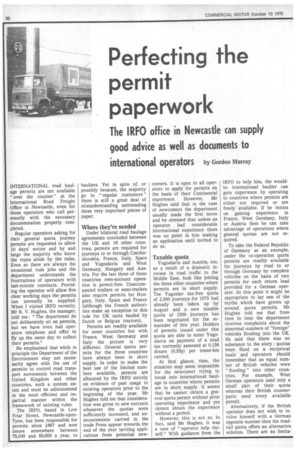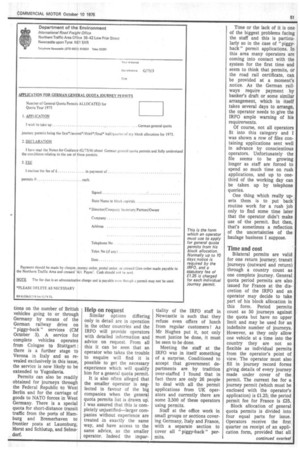Perfecting the permit paperwork
Page 52

Page 53

If you've noticed an error in this article please click here to report it so we can fix it.
The IRFO office in Newcastle can supply good advice as well as documents to
international operators by Gordon Murray INTERNATIONAL road haulage permits are not available "over the counter" at the International Road Freight Office in Newcastle, even for those operators who call personally with the necessary documentation properly completed.
Regular operators asking for their general quota journey permits are requested to allow 10 days' notice and by and large the majority who know the ropes abide by the rules. Even so there are always the occasional rush jobs and the department understands the frustrations of operators with last-minute contracts. Providing the operator will allow five clear working days the permits can normally be supplied. When I visited IRFO recently, Mr R. V. Hughes, the manager, told me : "The department do not deliberately sit on permits, but we have even had operators telephone and offer to fly up the same day to collect their permits."
He emphasised that white in principle the Department of the Environment may not necessarily agree with the use of permits to control road transport movements between the United Kingdom and other countries, such a system exists and must be administered in the most efficient and impartial manner within the framework of existing rules.
The IRFO, based in Low Friar Street, Newcastle-uponTyne, has been responsible for permits since 1967 and now issues somewhere between 75,000 and 80,000 a year, to hauliers. Yet in spite of, or possibly because, the majority go to "regular customers" there is still a great deal of misunderstanding surrounding these very important pieces of paper.
Where they're needed
Under bilateral road haulage agreements concluded between the UK and 16 other countries, permits are required for journeys to or through Czechoslovakia, France, Italy, Spain and Yugoslavia and West Germany, Hungary and Austria. For the last three of these countries own-account operation is permit-free. Unaccompanied trailers or semi-trailers also require permits for Hungary, Italy, Spain and France (although the French authorities make an exception to this rule for UK units hauled by Dutch or Belgian tractors).
Permits are readily available for some countries but with France, West Germany and Italy the picture is very different. General quota permits for the three countries have always been in short supply. In order to make the best use of the limited numbers available, permits are allocated by the IRFO strictly on evidence of past usage to existing operators prior to the beginning of the year. Mr Hughes told me that consideration was given to new entrants whenever the quotas were sufficiently increased, and announcements carried in the trade Press appear towards the end of the year inviting applications from potential new comers. It is open to all operators to apply for permits on the basis of their Continental experience. However, Mr Hughes said that in the case of newcomers the department usually made the first move and he stressed that unless an operator had considerable international experience there was no point in him making an application until invited to do so.
Taxable quota
Yugoslavia and Austria, too, as a result of a dramatic increase in road traffic to the Middle East, look like joining the three other countries where permits are in short supply. The Yugoslav tax-free quota of 2,500 journeys for 1975 had already been taken up by August and a new taxable quota of 1500 journeys has been negotiated for the remainder of this year. Holders of permits issued under this quota are able to enter Yugoslavia on payment of a road tax currently assessed at 0.138 dinars (0.35p) per tonne-km carried.
At first glance, then, the situation may seem impossible for the newcomer trying to break into international haulage in countries where permits are in short supply. It seems that he cannot obtain a general quota permit without prior operating experience and yet cannot obtain the experience without a permit.
However, this is not so. In fact, said Mr Hughes, it was a case of "operator help thyself." With guidance from the IRFO to help him, the wouldbe international haulier can gain experience by operating to countries where permits are either not required or are freely available. If he insists on gaining experience in France, West Germany, Italy or Austria then he can take advantage of operations where general quotas are not required.
To take the Federal Republic of Germany as an example, under the co-operation quota permits are readily available for journeys by road to or through Germany by complete vehicles on the basis of two permits for each return load provided for a German operator. At this point it might be appropriate to lay one of the myths which have grown up around quota permits. Mr Hughes told me that from time to time the department receives complaints about the abnormal numbers of "foreign" vehicles flooding into the UK. He said that there was no substance to the story : quotas were fixed on a reciprocal basis and operators should remember that an equal number of British vehicles were " flooding " into other countries. For example, West German operators used only a small part of their quota whereas their British counterparts used every available permit.
Alternatively, if the British operator does not wish to involve himself with a German opposite number then the roadrail quota offers an alternative solution. There are no limita tions on the number of British vehicles going to or through Germany by means of the German railway drive on " piggy-back " services (CM October 3). A service for complete vehicles operates from Cologne to Stuttgart : there is a further stage to Verona in Italy and as revealed exclusively in this issue, the service is now likely to be extended to Yugoslavia.
Permits can also be readily obtained for journeys through the Federal Republic to West Berlin and for the carriage of goods to NATO forces in West Germany. There is a special quota for short-distance transit traffic from the ports of Hamburg and Bremerhaven to frontier posts at Lauenburg, Horst and Schlutup, and Selmsdorf.
Help on request
Similar options differing only in detail are in operation in the other countries and the IRFO will provide operators with detailed information and advice on request. From all this it can be seen that an operator who takes the trouble to enquire will find it is possible to get the necessary experience which will qualify him for a general quota permit.
It is also often alleged that the smaller operator is neglected in favour of the big companies when the general quota permits list is drawn up. I was assured that this is completely unjustified—larger companies without experience are treated in exactly the same way, and have access to the same advice, as the smaller operator. Indeed the impar tiality of the IRFO staff in Newcastle is such that they refuse even offers of lunch from regular customers As Mr Hughes put it, not only must justice be done, it must be seen to be done.
Meeting the staff at the IRFO was in itself something of a surprise. Conditioned to accept that government departments are by tradition over-staffed I found that in fact there are only 26 people to deal with all the permit applications from UK operators and currently there are some 3,500 of these operators using permits.
Staff at the office work in small groups or sections covering Germany, Italy and France, with a separate section to cover all " piggy-back " permits. Time or the lack of it is one of the biggest problems facing the staff and this is particularly so in the case of " piggyback " permit applications. In this area many operators •are coming into contact with the system for the first time and seem to think that permits, or the road rail certificate, can be provided at a moment's notice. As the German railways require payment by banker's draft or some similar arrangement, which in iitself takes several days to arrange, the operator needs to give the IRFO ample warning of his requirements.
Of course, not all operators fit into this category and I was shown a row of files containing 'applications sent well in advance by conscientious operators. Unfortunately the file seems to be growing longer as staff are forced to spend so much time on rush applications, and up to onethird of the working day can be taken up by telephone queries.
One thing which really upsets them is to put back routine work for a rush job only to find some time later that the •operator didn't make use of the permit. But then, that's sometimes a reflection of the uncertainties of the haulage business I suppose.
Time and cost
Bilateral permits are valid for one return journey; transit journeys (outward and return) through a country count as one complete journey. General quota period permits are also issued for France at the discretion of the IRFO and an operator may decide to take part of his block allocation in this form. Period permits count as 50 journeys against the quota but have no upper limit and may be used for an indefinite number of journeys. However, as they only allow one vehicle at a time into the country they are not so flexible as individual permits from the operator's point of view. The operator must also fill in journey record forms giving details of every journey made under cover of the permit. The current fee for a journey permit (which must be enclosed with the operator's application) is £1.25; the period permit fee for France is £25.
Block allocation of general quota permits is divided into four equal parts for issue. Operators receive the first quarter on receipt of an application form, provided that all




































































































































